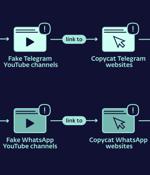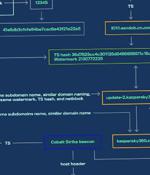Security News

The Emotet malware is now distributed using Microsoft OneNote email attachments, aiming to bypass Microsoft security restrictions and infect more targets. Emotet is a notorious malware botnet historically distributed through Microsoft Word and Excel attachments that contain malicious macros.

An Android voice phishing malware campaign known as FakeCalls has reared its head once again to target South Korean users under the guise of over 20 popular financial apps. FakeCalls was previously documented by Kaspersky in April 2022, describing the malware's capabilities to imitate phone conversations with a bank customer support agent.

Ukraine's cyberpolice has arrested the developer of a remote access trojan malware that infected over 10,000 computers while posing as game applications. "The man developed viral software, which he positioned as applications for computer games."

Copycat websites for instant messaging apps like Telegram and WhatApp are being used to distribute trojanized versions and infect Android and Windows users with cryptocurrency clipper malware. "All of them are after victims' cryptocurrency funds, with several targeting cryptocurrency wallets," ESET researchers Lukáš Štefanko and Peter Strý?ek said in a new analysis.
Akamai observes nearly seven trillion DNS requests daily and classifies malicious DNS transactions into three main categories: malware, phishing and command and C2. These attacks present a major threat to both enterprises and home users. They analyzed malicious DNS data and linked attackers to malware such as Emotet, a malware strain that is now one of the most dangerous cybercrime services, and QSnatch, which targets backups or file storage and is the most significant botnet threat in enterprise environments.

Roid malware 'FakeCalls' is circulating again in South Korea, imitating phone calls for over 20 financial organizations and attempting to fool bankers into giving away their credit card details. "We discovered more than 2500 samples of the FakeCalls malware that used a variety of combinations of mimicked financial organizations and implemented anti-analysis techniques," reads CheckPoint's report.

Cybercriminals are abusing Adobe Acrobat Sign, an online document signing service, to distribute info-stealing malware to unsuspecting users. Adobe Acrobat Sign is a free-to-try cloud-based e-signature service allowing users to send, sign, track, and manage electronic signatures.

Threat activity clusters affiliated with the Chinese and Russian cybercriminal ecosystems have been observed using a new piece of malware that's designed to load Cobalt Strike onto infected machines. The development comes as improved detection capabilities against Cobalt Strike, a legitimate post-exploitation tool used for red team operations, is forcing threat actors to seek alternative options or concoct new ways to propagate the framework to evade detection.

Sentinel Labs has previously seen spreadsheet files with malicious macros that launch PowerShell being dropped on cloned sites used by the APT. Deploying fake virus scanners. One example of Winter Vivern's resourcefulness in the Sentinel Labs report is the use of Windows batch files to impersonate antivirus scanners while, in reality, downloading malicious payloads.

While massive public data breaches rightfully raise alarms, the spike in malware designed to exfiltrate data directly from devices and browsers is a key contributor to continued user exposure, according to SpyCloud. The 2023 report identified over 22 million unique devices infected by malware last year.